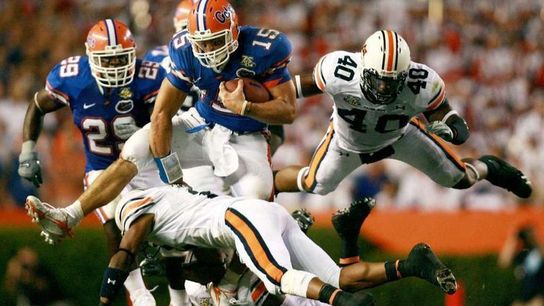No. 9 Florida hosts Towson on Saturday, but everyone in Gainesville is looking forward to next week, when No. 8 Auburn comes to the Swamp. The blue-and-orange Tigers and the blue-and-orange Gators played on an annual basis from 1927 through 2002, but those days are long gone.
Next Saturday's visit will be Auburn's first trip to Ben Hill Griffin Stadium since 2007, and they aren't scheduled to return until the next SEC scheduling rotation, which doesn't begin until 2026. Florida hasn't visited Jordan Hare Stadium since 2011, and the Gators won't return until 2024.
If the SEC repeats its current model when the new one begins in 2026, after next Saturday, Auburn's next trip to Florida won't come until 2031.
The SEC's expansion to 14 teams, combined with its refusal to expand or modify its 8-game conference schedule, has turned this once annual, nominally conference matchup into what is essentially an occasional non-conference series that happens to count in the conference standings.
“If you look over the next six years, I think we play Miami three times, Florida State six times, South Florida three times, Mississippi State once. So who’re the SEC teams?," Mullen said Monday.
That 2007 Auburn-Florida game, by the way? An absolute doozy. An unranked Auburn team beat Urban Meyer, offensive coordinator-and-future head coach Dan Mullen, a Heisman-bound Tim Tebow and No. 4 Florida, 20-17 on a field goal at the buzzer. It was the type of classic that the 14-team, stupid-rich modern SEC was built upon.
https://www.youtube.com/watch?v=f9GVOECEFRA
Twelve years later, it remains Auburn's most recent trip to Gainesville.
It doesn't have to be this way.
There is an easy fix, one that would better serve the SEC's players and students and wouldn't require increasing the conference schedule to nine games.
That fix is to ban divisions.
Each team would play three permanent rivals, and then split the 10 remaining SEC members (14 minus three permanent rivals, plus yourself) into groups of five, which would then alternate every year.
Florida, for example, would continue playing Georgia, Tennessee and South Carolina every year. The Gators would then play, again, for example, Kentucky, Missouri, Texas A&M, Mississippi State and Auburn in even years, and Vanderbilt, Ole Miss, Arkansas, Alabama and LSU in odd years. Fiddle with the arrangements all you like, but that's the general point.
With this plan, every SEC player gets to play in every SEC stadium over the course of a 4-year career, and every SEC undergraduate gets to see every conference opponent inside their home stadium over the course of their 4-year career.
The Southeastern Conference would become a conference again.
“I think it’s an injustice for the kids," Mullen said. "We should mix those games up and you should play more teams from the West and get the opportunity to play more SEC games. You come play in this league and play in those games, conference games are a lot of fun, playing other SEC teams. I think moving forward scheduling-wise, obviously conference, we don’t control that, but I think that’d be a heck of a deal and I know we’re working to play more Power 5 teams.”
Instead, under the current arrangement, a Florida student who begins his or her undergraduate studies in 2020 could obtain their Bachelor's, Masters and Doctorate degrees at UF and not see Auburn play inside the Swamp once.
